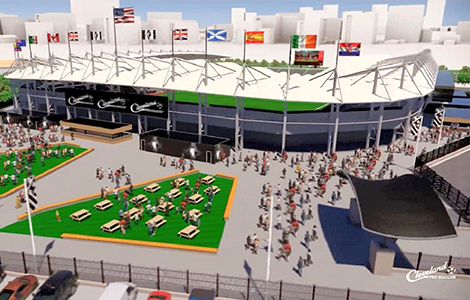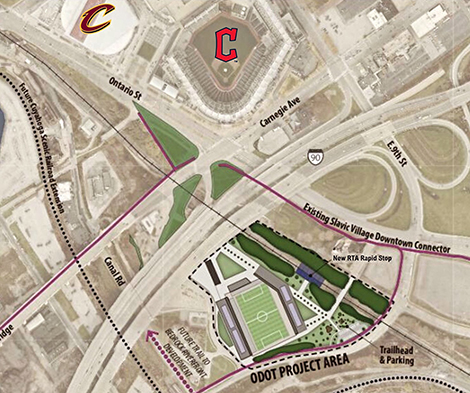The article is published as part of an exclusive content-sharing agreement with neo-trans.blog.
In a request for qualifications (RFQ) issued by the city of Cleveland last week for the development of lakefront land, all but 22 acres of it has a city masterplan established for it. That 22-acre exception is the site occupied by Huntington Bank Field which the city is offering up as a blank slate for those with ideas and other wherewithal.
While much media attention has focused on who should pay for demolishing the 1999-built stadium, the city made it clear in its RFQ that demolition should not be a foregone conclusion.
“The city’s current assumption is that the stadium will be demolished in 2029 if the Browns move to Brook Park, Ohio,” the RFQ states. “However, developers are also welcome to propose a reuse of the existing stadium.”
In fact, many people on sports talk radio, social media and online discussion forums have asked whether the 67,431-seat stadium could be partially demolished and retrofitted as a professional soccer stadium.
Taking off the stadium’s upper and middle decks could create a stadium with roughly 27,000 seats — perfect for a United Soccer League stadium or lesser division, and would even be at the low-end scale for a Major League Soccer stadium. Cincinnati’s TQL stadium has 26,000 seats but offers The Bailey standing-room area for 3,170 people.
So NEOtrans asked if there was interest among the folks over at Cleveland Pro Soccer, the group trying to bring pro soccer to Greater Cleveland — the only top-40 market in the USA without a pro soccer stadium or one under construction.
Turns out they’ve already looked at Huntington Bank Field — and rejected it due to its high costs and other reasons.
“We’ve considered all options over the past several years of diligence, including Huntington Bank Field,” said Gina Prodan Kelly, chief marketing officer at Cleveland Pro Soccer (CSG). “We found our South Gateway location to be the right fit.”
The group is planning to construct a new 10,000-seat, modular-built South Gateway Stadium, just south of the Inner Belt section of Interstate 90. Cost of the project is estimated at $50 million. To the north of the highway is the Gateway Sports and Entertainment complex featuring Progressive Field and Rocket Arena.
CSG has secured the rights to two professional soccer teams. One is an MLS Next Pro men’s team and the other is a Women’s Premier Soccer League (WPSL) Pro team. Both teams could start play as early as next year.

Between those two teams and other events, CSG anticipates that their South Gateway Stadium could attract more 400,000 people to Downtown Cleveland each year — roughly half of what Huntington Bank Field draws for its dozen annual football games and other events.
And, with the passage of the state budget June 30, it created the $1.7 billion Ohio Cultural and Sports Facility Performance Grant Fund. From that, the budget earmarked $600 million in funds that have been unclaimed for more than 10 years to build a new Brook Park stadium for the Cleveland Browns.
But a grant from that new fund also could be used for the proposed soccer stadium as well as for development around sports facilities, so-called “ballpark villages.” CSG was among Ohio’s pro sports interests supporting the creation of that fund.
“We think Gateway, the neighborhood where Clevelanders have cheered on their favorite sports teams for 30 years, is the best location for sports in the city,” she said. “This project will be additive to that neighborhood — and finally complete the vision of Gateway.”

The Cleveland Metroparks has an option to buy 13.6 acres of land from the Ohio Department of Transportation for $4.25 million. The soccer stadium and a hub for several connecting all-purpose trails would be located on that land.
CSG also has a purchase agreement to acquire a half-acre property at 836 Broadway Ave. for additional development related to the soccer stadium, such as retail, restaurants and offices.
That property is in the process of being acquired from McElwee Properties LLC, whose principal is Bob McElwee. He also is the owner and president of Cleveland Black Oxide. That business relocated from this site in 2021 to 11340 Brookpark Rd. in suburban Brooklyn.
The Broadway site would be connected to the stadium by an existing, unused street bridge over the Greater Cleveland Regional Transit Authority’s (GCRTA) rapid transit tracks. GCRTA and the Northeast Ohio Areawide Coordinating Agency, which distributes federal transportation funds, are supportive of building a new train station here.
For more updates about Cleveland, sign up for our Cleveland Magazine Daily newsletter, delivered to your inbox six times a week.
Cleveland Magazine is also available in print, publishing 12 times a year with immersive features, helpful guides and beautiful photography and design.




